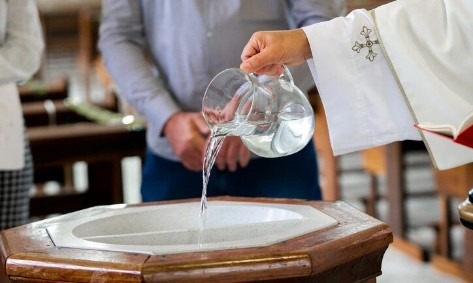Blessed Water - A Sacramental
-
Blessed Water…A Sacramental

Water blessed by a priest or deacon by a specific rite sets it apart from ordinary water, making it a sacramental. Sacramentals are sacred signs instituted by the Church to prepare us to receive grace. Unlike sacraments, which directly confer grace, sacramentals dispose us toward it. The blessing involves a prayer and sometimes the addition of salt, symbolizing purification. Holy water is found in fonts at church entrances and in homes. Historical records show that Christians blessed water as early as the second century. This likely drew from Jewish traditions of ritual purification.
Holy water has a special connection to the sacrament of baptism which cleanses a person of original sin. When we dip our fingers in holy water and make the sign of the cross, entering the church, we recall our baptism. While holy water does not forgive sins like confession or baptism, it prepares our hearts for grace. It invites us to approach God with a clean conscience.
Holy water is also a means of protection against evil. Blessed objects carry the Church’s authority to repel negative influences. This stems from early Christian exorcism rites intended to bless and protect. Holy water is sprinkled in homes or on objects to ask God to drive away harm. It is not a magical shield but strengthens faith in God’s power.
Holy water plays a prominent role in Catholic liturgy and in personal prayer. During the Easter Vigil, the priest blesses water for baptism and at the beginning of Sunday Mass, the priest may sprinkle the people with blessed water. Objects like rosaries and medals may be blessed with holy water. We can use holy water to bless ourselves before bed or during times of distress. Parents may also use it to bless their children.
Only a priest or deacon can bless holy water in the Catholic Church with specific prayers from the Roman Ritual. This restriction highlights the Church’s authority over sacramentals. Holy water should be handled with care. Fonts in churches should be regularly cleaned and refilled. At home, it should be stored respectfully in a dedicated container. If it spoils, it must be disposed of properly by pouring it into the ground.
